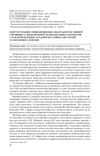 December 2023 in “Bulletin of the Medical Institute of Continuing Education”
December 2023 in “Bulletin of the Medical Institute of Continuing Education” Angelica Dahurica extract helps reduce hair loss and improve hair growth and scalp condition.
 November 2023 in “Deleted Journal”
November 2023 in “Deleted Journal” Cedrus libani has potential medicinal uses but needs more safety studies.
 November 2023 in “International journal of Ayurveda and pharma research”
November 2023 in “International journal of Ayurveda and pharma research” The herbal hair oil effectively promotes hair growth, nourishes the scalp, and prevents dandruff.
 September 2023 in “Journal of pharmacognosy and phytochemistry”
September 2023 in “Journal of pharmacognosy and phytochemistry” Plumbago zeylanica has valuable medicinal properties but needs sustainable cultivation methods.
 February 2023 in “Asian journal of pharmaceutical research and development”
February 2023 in “Asian journal of pharmaceutical research and development” Flavonoids in Iraqi marshland plants have potential health benefits like antioxidant and anti-inflammatory effects.
 January 2023 in “International Journal for Research in Applied Science and Engineering Technology”
January 2023 in “International Journal for Research in Applied Science and Engineering Technology” Herbs like Tea Tree Oil and Aloe Vera could be safer, more conditioning antidandruff alternatives to synthetic products.
 January 2023 in “Journal of pharmacognosy and phytochemistry”
January 2023 in “Journal of pharmacognosy and phytochemistry” Herbal home remedies can effectively treat hair loss with fewer side effects.
 October 2022 in “Gadua Journal of Pure and Allied Science”
October 2022 in “Gadua Journal of Pure and Allied Science” Terbinafine is the most effective treatment for tinea capitis, a scalp infection often confused with other conditions.
 August 2022 in “International journal of research in pharmacy and chemistry”
August 2022 in “International journal of research in pharmacy and chemistry” Teak is a durable, termite-resistant wood with medicinal benefits.

No single biomarker is reliable enough for diagnosing and assessing SLE.

False daisy is a medicinal herb with many health benefits, including hair growth promotion.
 May 2021 in “Boletín latinoamericano y del Caribe de plantas medicinales y aromáticas”
May 2021 in “Boletín latinoamericano y del Caribe de plantas medicinales y aromáticas” Microsechium helleri extract has antioxidant, anti-inflammatory, antidiabetic, and heart-protective benefits.
 July 2020 in “International journal for research in applied science and engineering technology”
July 2020 in “International journal for research in applied science and engineering technology” The herbal shampoo made from local plants can reduce hair loss and promote hair growth.
 January 2019 in “Springer eBooks”
January 2019 in “Springer eBooks” Some chemicals and drugs can cause hair loss, which usually grows back after stopping the treatment.
 July 2018 in “Elsevier eBooks”
July 2018 in “Elsevier eBooks” Some drugs can cause reversible hair loss, but certain chemotherapy drugs may lead to permanent hair loss; drugs can also change hair color and texture.
 April 2017 in “International journal of research in Ayurveda and pharmacy”
April 2017 in “International journal of research in Ayurveda and pharmacy” Ayurvedic methods can help reduce the harmful effects of chemicals in cosmetics.
 January 2017 in “Springer eBooks”
January 2017 in “Springer eBooks” The document explains various skin conditions and their treatments.
 October 2015 in “Elsevier eBooks”
October 2015 in “Elsevier eBooks” Spironolactone can cause side effects like high potassium levels and breast enlargement, and patients need careful monitoring.
 January 2015 in “Farmatsevtychnyĭ zhurnal”
January 2015 in “Farmatsevtychnyĭ zhurnal” The tincture made from nettle, sage, and horse chestnut in a 5:3:2 ratio is effective for treating telogen effluvium.
 January 2012 in “Human health handbooks”
January 2012 in “Human health handbooks” Traditional Indian remedies are used for hair health, but more scientific evidence is needed to prove their safety and effectiveness.
 May 2010 in “Journal of the Dermatology Nurses' Association”
May 2010 in “Journal of the Dermatology Nurses' Association” Cicatricial alopecia causes permanent hair loss and is treated to relieve symptoms and stop progression.
 May 2003 in “Facial Plastic Surgery Clinics of North America”
May 2003 in “Facial Plastic Surgery Clinics of North America” Hair loss can be treated with medications like minoxidil and finasteride or surgery, but treatment effectiveness varies by alopecia type and accurate diagnosis is important.
 July 2002 in “Australasian Journal of Dermatology”
July 2002 in “Australasian Journal of Dermatology” Maintaining anticoagulation is crucial for patients with antiphospholipid syndrome.
 July 2002 in “Australasian Journal of Dermatology”
July 2002 in “Australasian Journal of Dermatology” A woman with lupus had hair loss and skin issues that were successfully treated with medications.
 September 1997 in “JEADV. Journal of the European Academy of Dermatology and Venereology/Journal of the European Academy of Dermatology and Venereology”
September 1997 in “JEADV. Journal of the European Academy of Dermatology and Venereology/Journal of the European Academy of Dermatology and Venereology” The document concludes that treatments like oral anti-androgens, minoxidil, and topical spironolactone can be effective for hair loss in men and women.
 January 1987 in “Side effects of drugs annual”
January 1987 in “Side effects of drugs annual” Some cosmetics and dermatological drugs can cause allergic reactions and side effects, like skin irritation and systemic issues.

Detailed history and physical examination are crucial for diagnosing hair loss.
 September 1997 in “Journal of The European Academy of Dermatology and Venereology”
September 1997 in “Journal of The European Academy of Dermatology and Venereology” Topical spironolactone effectively treats hair loss in women.
96 citations,
April 2017 in “Oncotarget” Smaller nanoemulsions can penetrate skin and hair follicles better, which may be useful for delivering drugs and vaccines through the skin.
2 citations,
June 2023 in “Current Nutrition & Food Science” Hinokiflavone may help treat cancers and other health issues.




























